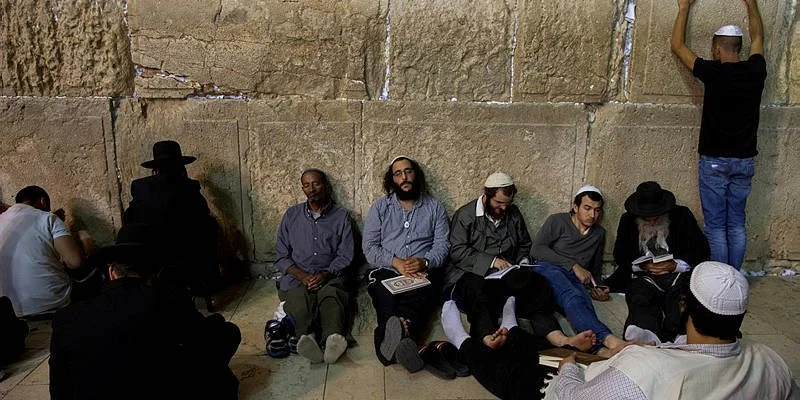The 17th of Tammuz is one of the four fasts whose source is in the prophetic writings (Zekharia 8:19) and which were instituted in memory of the destruction of the Temple.
According to the tradition of our Sages, five calamities took place on this date at various times during our history: "The (first) tablets were broken, the daily sacrifices ceased, the wall of Jerusalem was breached, and the wicked Apostemus burned the Torah and placed an idol in the Temple. "
The Shulhan Arukh rules that "everyone is obligated to fast on these four fast days, and it is forbidden to depart from accepted custom."
Since the obligation of fasting on the 17th of Tammuz arises from its voluntary acceptance by the nation, "while they willingly accepted upon themselves to fast on all of these four fast days, they did not accept the degree of severity of the public fast that is associated with Tish'a B'Av.”
One of the differences in this regard is the duration of the fast: while Tish'a B'Av is observed from one evening to the next night, the fast of the 17th of Tammuz starts at daybreak and concludes at nightfall (20:07). It is permitted to eat before daybreak if one made this condition before going to sleep. According to the Rama, one need not make a condition in order to drink before daybreak.
Another difference concerns the prohibitions involved on the fast day. On Tish'a B'Av five activities are prohibited: eating and drinking, bathing, anointing, wearing of leather shoes, and marital relations. On the 17th of Tammuz only eating and drinking are prohibited.
With regard to brushing teeth and rinsing one's mouth, the Shulhan Arukh rules: "Someone who usually rinses his mouth on a public fast it is not appropiate to do so," while the Arukh Ha-Shulhan adds: "It seems to me that this refers to one who takes water deep into his mouth, lifts his face and gargles the water in his throat. But someone who takes water in his mouth and remains bent over, with the intention only of cleaning his teeth, such that there is no danger that he will swallow the water - this is permitted, except on Tish'a B'Av and Yom Kippur.”
A further difference between Tish'a B'Av and the other three fasts concerns the categories of those exempted from fasting. On the 17th of Tammuz someone who is ill – even if not dangerously so (such as someone who suffers intolerably from heat or has aches and pains that rack the whole body even though there is no danger to his/her life is exempted from the fast. Pregnant and nursing mothers are exempted from fasting.
Between the 17th of Tammuz and Rosh Hodesh Av
The Mishnah in massekhet Ta'anit, teaches:
"Upon entering (the month of) Av, we diminish our joy" – but there is no explicit measure of how much we are to diminish our joy. The Shulhan Arukh rules similarly. The Rama adds, "It is customary to be strict in this regard and not to marry from the 17th of Tammuz onwards until after Tish'a B'Av." This custom spread throughout Ashkenazi communities, but not among Sefardi ones.
Additional signs of mourning are adopted starting from the 17th of Tammuz:
This year for Sephardim there are no restrictions of haircuts, washing clothes or bathing. The Rama teaches, "It is customary to be stringent with regard to laundry only from the beginning of Rosh Hodesh, but haircuts are to be avoided even from the 17th of Tammuz." This custom applies only among Ashkenazi communities. Even amongst Ashkenazim there are some who are stringent about haircuts but lenient about shaving (for those who shave daily) prior to the actual week in which Tisha B’Av occurs.
The Shulhan Arukh teaches, "It is good to be careful and refrain from reciting the blessing "shehehiyanu" for a new seasonal fruit or a new garment throughout the "three weeks," but the blessing may be recited at a Brit Milah and Pidyon Ha-Ben in order that one not miss the opportunity for this mitzvah." This custom is observed among Sefaradim as well. Many authorities permit the recitation of "shehehiyanu" on the Shabbatot that fall between the 17th of Tammuz and Tish'a B'Av.
The Magen Avraham writes, "It seems to me that it is forbidden to dance from the 17th of Tammuz onwards" – from which we derive the prohibition of playing or listening to music during this period. There are Achronim who are lenient in permitting listening to background music or classical music. Rav Ovadiah Yosef says, “At a celebration of a mitzvah such as a brit or pidyon haben or a siyum for a tractate of Talmud or a bar mitzvah one may listen to Jewish songs with musical accompaniment, for as long as it is a mitzvah we can be lenient.”
People frequently ask about the permissibility of going to movies or watching television. Without addressing the question of the "kashrut" of movies and television in general, it would seem that the medium of the entertainment is less important than the content. Hence it would appear permissible to watch programs about current events, nature etc. or a film with a plot; however, one should avoid programs that are clearly for entertainment, as well as musical concerts (either classical or with singers). There would also seem to be a difference between private/family viewing of television and going to the cinema, which might fall under the category of a "public gathering for enjoyment" (simchat mereim). In this regard it should be noted that this ruling reflects not only the halakha but also educational considerations: it reinforces our consciousness of the Temple's destruction – a tragedy whose commemoration is undoubtedly more important than one movie in the year!

